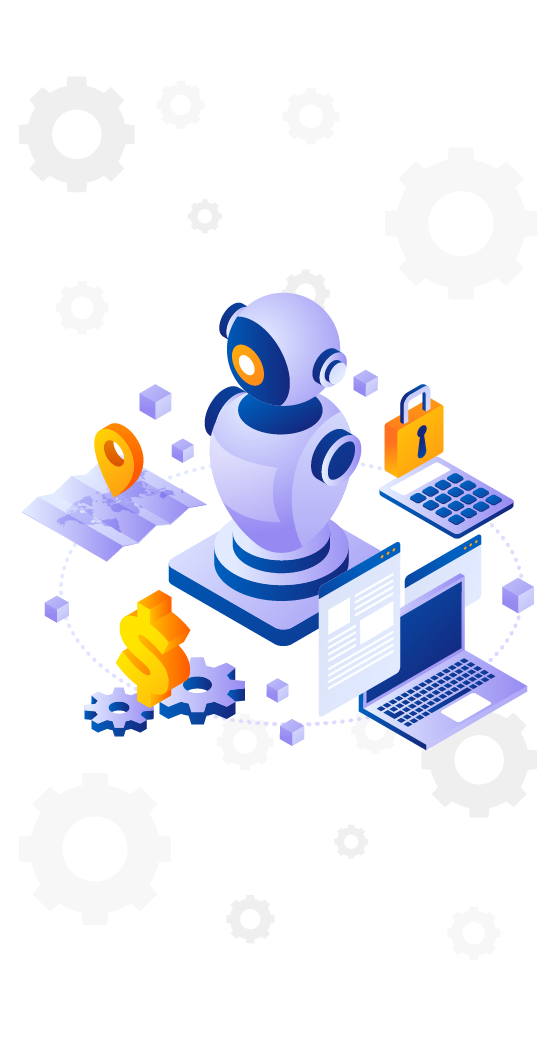What is Business Process Automation (BPA)?
Business Process Automation (BPA) leverages cutting-edge technologies to automate complex, mission-critical workflows. It goes beyond traditional data management, focusing on optimizing core business functions like customer onboarding, inventory management, and financial reporting. By implementing business process management software and BPM solutions, organizations can achieve operational excellence, reduce manual intervention, and enhance scalability.
Integrating business process outsourcing services further strengthens BPA initiatives by providing expertise in niche areas. From AI-driven tools to workflow orchestration, BPA is reshaping how businesses operate. Learn how to harness its potential for your organization and stay ahead in today’s competitive landscape
What is the Difference Between BPA and RPA?
Business Process Automation (BPA) refers to the use of technology to automate and optimize complex workflows, reducing manual intervention and improving operational efficiency. It includes a variety of tools and methods, such as business process management solutions, BPM software, and custom ERP systems, tailored to meet specific business requirements.
One advanced approach within BPA is Robotic Process Automation (RPA), which employs software bots to execute rule-based tasks like data entry, processing, and system integrations. These bots mimic human actions but operate with greater speed and accuracy. When combined with Artificial Intelligence software and AI agents, RPA can handle more complex tasks, enabling predictive analytics and intelligent decision-making. For businesses looking to innovate, business process re-engineering and custom software development offer tailored solutions. Explore how AI companies in India and leading software companies can help you implement cutting-edge BPA strategies.
Business Automation Use Cases:
Banking and Insurance
Manufacturing
Healthcare
Retail
Telecom
Supply Chain
Finance and Accounting
Human Resources
Marketing and Sales
Customer Service
What Process Automation Means in Business
In today’s dynamic business environment, business process management solutions such as BPM software are essential for achieving operational flexibility and efficiency. These platforms enable organizations to automate a wide range of processes, significantly reducing manual intervention, associated costs, and error rates.
Workflow automation is a critical component of modern process automation software, streamlining operations across departments and ensuring optimal resource utilization. This is particularly beneficial in scenarios where teams are managing multiple projects with constrained timelines. By leveraging automation, businesses can enhance productivity and redirect human resources toward higher-value tasks.
For organizations requiring tailored solutions, software companies in India specialize in developing custom software and custom ERP systems that align with unique business requirements. These providers also offer expertise in business process re-engineering, enabling companies to redesign and optimize their workflows for peak performance.
Advanced technologies like robotic process automation (RPA) and artificial intelligence software are reshaping the automation landscape. AI companies in India are pioneering the development of AI agents capable of handling complex decision-making processes and automating intricate tasks, driving innovation and scalability in business operations.
By integrating these tools, organizations can stay ahead in a competitive market, ensuring long-term growth and adaptability.

Native Automation vs. Business Process Automation
Automation can be achieved through native automation, which leverages existing software capabilities to streamline tasks. However, for more complex and scalable solutions, specialized business process automation (BPA) platforms like Automate are ideal. Automate is designed to replace manual, repetitive tasks with efficient, automated workflows, enabling teams to allocate more time to strategic, high-value activities.
This robust automation solution supports both on-premises and cloud-based deployments, offering flexibility to suit diverse IT environments. It integrates seamlessly with your existing systems, centralizing data and applications to create a unified workflow ecosystem. By implementing Automate, organizations can achieve significant improvements in productivity, operational efficiency, and error reduction while ensuring scalability for future growth.
BPA Software Capabilities
Drag-and-Drop Workflow Design
Modern BPA software often includes intuitive drag-and-drop interfaces, allowing users to visually design workflows without technical expertise. This feature simplifies the creation of complex automation processes, making it accessible for teams of all skill levels.
Real-Time Process Monitoring
BPA tools provide real-time dashboards to track the status of automated workflows. This capability ensures transparency, enabling businesses to identify bottlenecks, measure performance, and make data-driven decisions to optimize operations.
Cross-Platform Compatibility
Top-tier BPA solutions support integration with a wide range of platforms, from legacy systems to modern cloud applications. This ensures seamless data flow and process automation across your entire tech stack, eliminating silos and improving efficiency.
Customizable Triggers and Conditions
BPA software allows users to set specific triggers and conditions to initiate workflows. For example, an automated process can start when an email is received, a form is submitted, or a database is updated. This flexibility ensures automation aligns perfectly with your business needs.
Advanced Error Handling and Notifications
Robust BPA tools include error detection and resolution features. If a process fails, the system can automatically retry, escalate, or notify the relevant team member. This minimizes downtime and ensures smooth operations even when issues arise.
Scalable Automation for Growing Businesses
BPA software is designed to scale with your business. Whether you’re automating a single department or an entire enterprise, these tools can handle increasing workloads and complexity without compromising performance.
Compliance and Security Features
For industries with strict regulatory requirements, BPA software often includes built-in compliance and security measures. This ensures that automated processes adhere to standards like GDPR, HIPAA, or ISO, protecting sensitive data and reducing legal risks.
Intelligent Document Processing (IDP)
Many BPA solutions now incorporate AI-powered document processing capabilities. This feature can extract, classify, and validate data from unstructured documents like invoices, contracts, or emails, significantly reducing manual data entry.
API Integration Kit
An API integration kit provides the tools needed to connect BPA software with third-party applications and systems. This capability ensures smooth data exchange and workflow automation across multiple platforms, enhancing interoperability and enabling businesses to create end-to-end automated processes.
Machine Learning and AI
Machine learning and AI capabilities take automation to the next level by enabling intelligent decision-making and predictive analytics. These features allow BPA software to learn from data, identify patterns, and adapt workflows dynamically, making processes smarter, faster, and more efficient over time.
Benefits of Business Process Automation Services
Increased Operational Efficiency
BPA services eliminate repetitive, manual tasks by automating workflows, allowing employees to focus on higher-value activities. This leads to faster task completion, reduced bottlenecks, and smoother operations across departments.
Cost Savings
By automating routine tasks, businesses can significantly reduce labor costs and minimize errors that lead to financial losses. BPA services also lower operational expenses by optimizing resource allocation and reducing the need for manual intervention.
Improved Accuracy and Consistency
Manual processes are prone to human error, which can lead to costly mistakes. BPA services ensure tasks are performed with precision and consistency, improving the quality of outputs and reducing the risk of errors.
Enhanced Scalability
As your business grows, manual processes can become overwhelming. BPA services provide scalable solutions that can handle increased workloads without requiring additional resources, ensuring your operations remain efficient even during periods of expansion.
Better Customer Experience
BPA services enable faster response times and personalized interactions, leading to improved customer satisfaction. Automated workflows ensure that customer inquiries, orders, and issues are handled promptly and efficiently.
Technologies and Tools We Work With






















The Role of BPA in Digital Transformation
Streamlining Operations for Agility
BPA eliminates manual, repetitive tasks, enabling businesses to operate more efficiently and respond quickly to market changes. By automating workflows, organizations can adapt to new demands without being bogged down by outdated processes.
Enhancing Data-Driven Decision Making
BPA integrates data from multiple sources, providing real-time insights and analytics. This empowers businesses to make informed, data-driven decisions that drive growth and improve operational performance.
Improving Customer Experience
Digital transformation is all about delivering value to customers. BPA enables faster response times, personalized interactions, and seamless service delivery, leading to higher customer satisfaction and loyalty.
Reducing Costs and Increasing ROI
By automating routine tasks, BPA reduces operational costs associated with manual labor and errors. This frees up resources to invest in innovation and strategic initiatives, maximizing return on investment (ROI).
Enabling Scalability and Growth
As businesses grow, manual processes become unsustainable. BPA provides scalable solutions that can handle increased workloads without compromising efficiency, ensuring seamless growth.
Facilitating Integration of Advanced Technologies
BPA acts as a foundation for integrating advanced technologies like Artificial Intelligence (AI), Machine Learning (ML), and Robotic Process Automation (RPA). These technologies enhance automation capabilities, making processes smarter and more adaptive.
Ensuring Compliance and Risk Management
Digital transformation often involves navigating complex regulatory requirements. BPA ensures compliance by automating audits, documentation, and reporting, reducing the risk of errors and penalties.
Empowering Employee Productivity
By automating mundane tasks, BPA allows employees to focus on creative, strategic, and high-value activities. This not only boosts productivity but also enhances employee satisfaction and engagement.
Driving Innovation and Competitive Advantage
BPA enables businesses to experiment with new ideas and processes without disrupting existing operations. This fosters a culture of innovation, helping organizations stay ahead of competitors.
Creating a Future-Ready Organization
BPA lays the groundwork for continuous improvement and adaptability. By embracing automation, businesses can future-proof their operations and remain resilient in the face of technological advancements and market shifts.
Challenges of Business Process Management
Business Process Management (BPM) offers numerous benefits, but it also comes with its own set of challenges. One major hurdle is the complexity of integrating BPM solutions with existing systems, especially in organizations with legacy infrastructure. Resistance to change from employees can also hinder adoption, as teams may be reluctant to abandon familiar processes for new, automated workflows. Additionally, poorly defined processes or a lack of clarity in objectives can lead to inefficiencies, defeating the purpose of BPM. Ensuring data security and compliance with regulatory standards adds another layer of complexity, particularly in industries like healthcare or finance. Lastly, the cost of implementing and maintaining BPM tools can be significant, requiring ongoing investment in technology and training. Overcoming these challenges requires careful planning, stakeholder buy-in, and a clear strategy to align BPM initiatives with organizational goals.
Why Choose SOD for Business Process Automation Services?
Cloud, AI/ML, big data, blockchain, IoT, AR, and VR.
Ensures projects meet the highest quality standards.
Protects customer data with robust security measures.
Adherence to HIPAA, GAMP, PCI DSS, and more.
Knowledge of processes and regulations across 30+ industries.
Comprehensive solutions from consultation to implementation.
Automation services designed to grow with your business.
Delivering measurable results for clients worldwide.
Tailored solutions aligned with your business goals.
Leveraging the latest BPA software, AI agents, and RPA tools.
SOD’s Offerings on Business Automation Services
Business Process Automation Strategy Development
End-to-End Automation Solution Deployment
Intelligent Automation with AI and Machine Learning
Industry-Specific Automation Solutions
Automation Maintenance and Optimization
Compliance and Security-Focused Automation
Custom Automation Tool Development
Frequently Asked Questions
The implementation timeline for a BPA solution depends on the complexity of the processes being automated and the size of your organization. Typically:
1. Simple workflows can be automated in 2-4 weeks.
2. Medium-complexity processes may take 1-3 months.
3. Large-scale automation projects involving multiple systems or departments can take 3-6 months or more.
4. A detailed assessment by a BPA service provider can give you a more accurate timeline.
BPA offers several benefits, including:
1. Increased Efficiency: Automating tasks speeds up processes and reduces manual effort.
2. Cost Savings: Reduces labor costs and minimizes errors that lead to financial losses.
3. Improved Accuracy: Eliminates human errors in repetitive tasks.
4. Enhanced Scalability: Allows businesses to handle increased workloads without additional resources.
5. Better Customer Experience: Faster response times and personalized services.
Almost any repetitive, rule-based process can be automated, such as:
1. Data Entry and Processing
2. Invoice and Payment Processing
3. Customer Support (e.g., chatbots)
4. Employee Onboarding and HR Tasks
5. Inventory and Supply Chain Management
6. Reporting and Analytics
Choosing the right BPA solution depends on your business needs. Consider the following steps:
1. Identify Pain Points: Determine which processes are time-consuming or error-prone.
2. Evaluate Tools: Look for features like no-code/low-code platforms, AI capabilities, and integration options.
3. Check Scalability: Ensure the solution can grow with your business.
4. Consult Experts: Work with a BPA service provider to assess your needs and recommend the best tools.
Yes, when implemented correctly, BPA is highly secure. Reputable providers ensure:
1. Data Encryption: Protects sensitive information.
2. Access Controls: Limits who can view or modify automated processes.
3. Compliance: Adheres to regulations like GDPR, HIPAA, and PCI DSS.
4. Regular Audits: Identifies and mitigates potential security risks.
Contact information
write us or contact us on our social media





